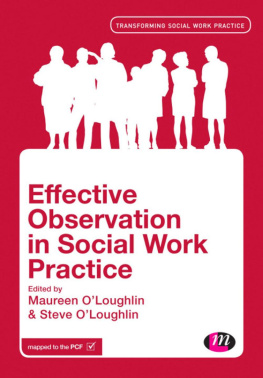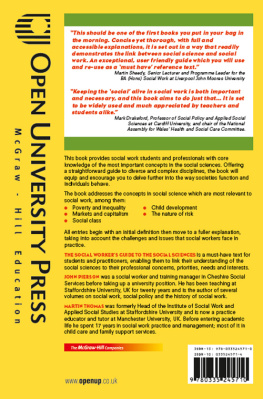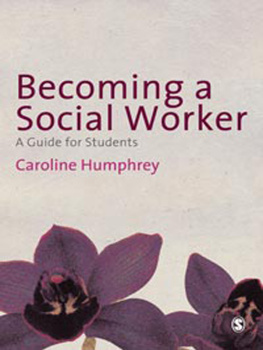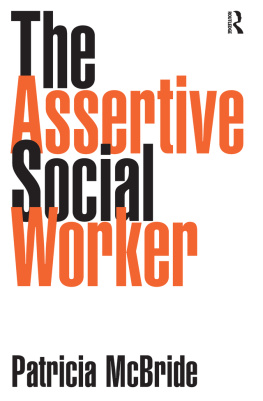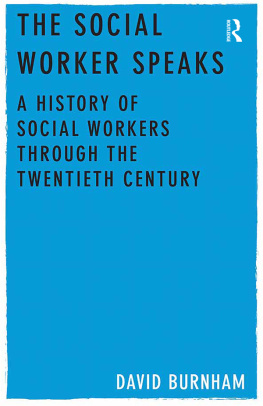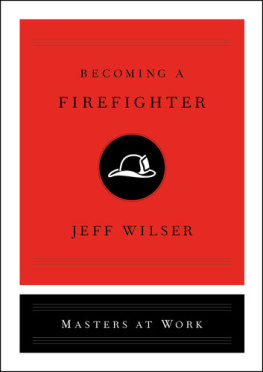NATIONAL INSTITUTE SOCIAL SERVICES LIBRARY
Volume 1
INTRODUCTION TO A SOCIAL WORKER
INTRODUCTION TO A SOCIAL WORKER
THE NATIONAL INSTITUTE FOR SOCIAL WORK TRAINING
First published in 1964 by George Allen & Unwin Ltd.
This edition first published in 2022
by Routledge
2 Park Square, Milton Park, Abingdon, Oxon OX14 4RN
and by Routledge
605 Third Avenue, New York, NY 10158
Routledge is an imprint of the Taylor & Francis Group, an informa business
1964 George Allen & Unwin Ltd.
All rights reserved. No part of this book may be reprinted or reproduced or utilised in any form or by any electronic, mechanical, or other means, now known or hereafter invented, including photocopying and recording, or in any information storage or retrieval system, without permission in writing from the publishers.
Trademark notice: Product or corporate names may be trademarks or registered trademarks, and are used only for identification and explanation without intent to infringe.
British Library Cataloguing in Publication Data
A catalogue record for this book is available from the British Library
ISBN: 978-1-03-203381-5 (Set)
ISBN: 978-1-00-321681-0 (Set) (ebk)
ISBN: 978-1-03-205960-0 (Volume 1) (hbk)
ISBN: 978-1-03-205965-5 (Volume 1) (pbk)
ISBN: 978-1-00-320006-2 (Volume 1) (ebk)
DOI: 10.4324/9781003200062
Publishers Note
The publisher has gone to great lengths to ensure the quality of this reprint but points out that some imperfections in the original copies may be apparent.
Disclaimer
The publisher has made every effort to trace copyright holders and would welcome correspondence from those they have been unable to trace.
INTRODUCTION TO A SOCIAL WORKER
produced by
THE NATIONAL INSTITUTE
FOR SOCIAL WORK TRAINING
first published in 1964
second impression 1967
This book is copyright under the Berne Convention. Apart from any fair dealing for the purposes of private study, research, criticism or review, as permitted under the Copyright Act, 1956, no portion may be reproduced by any process without written permission. Enquiries should be addressed to the publishers.
George Allen & Unwin Ltd., 1964
printed in great britain
in 10 on 11 point Times Roman type
by c. tinling and co. ltd.,
prescot
PREFACE
This book is an introduction to social casework, that is to say, it is concerned with social work with individuals and families. It does not set out to discuss the methods used in social work with groups or with communities. The purpose is to present in simple terms a few of the important aims and concepts of social casework and to illustrate some of its methods.
The book is written primarily for students who are starting their training in social work; we hope that it will prove useful to other students in social studies courses. It is written also for those in the community who meet people in trouble and who may not know the help that social work can offer, those who may consider entering the profession, and others who just wonder what it is all about.
In the preparation of this book the National Institute has been assisted by a generous and imaginative grant from the Institute of Social Welfare. This grant enabled us to have the help of Miss Florence Mitchell for six months. During this time she carried out the preparatory task of consulting tutors in social work about the kind of book needed for beginning students, she also prepared much of the text of this book, incorporating case material she had collected over a period of time, as well as the records in chapters III, IV and V which are contributed by other social workers.
Miss Mitchell, now tutor in charge of the course in general social work at Croydon Technical College, brought to this task an intimate knowledge of social work, experience as a teacher and the ability to elicit interest and help for this co-operative enterprise. The book was thus shaped in the course of discussion with practitioners and tutors and with help from Dr E. L. Younghusband and Miss K. M. Lewis, Advisers in Social Work Training at the National Institute. We are grateful to all those whose help has made this publication possible.
R. Huws Jones
CONTENTS
preface
ii . The Methods of Social Work
iii . Social Workers in Action: Mrs White and Gordon
iv . Social Workers in Action: Mr and Mrs Upton
v . Social Workers in Action: Mr and Mrs Bristoe
vi . The Boundaries of Social Work
CHAPTER I PEOPLE WHO NEED SOCIAL WORK HELP
The term social worker means different things to different people. For the purpose of this book a social worker may be described as one who helps people and families who have social problems or who are under some heavy stress which they cannot cope with by themselves. It is necessary to make clear what kind of problems, what sort of people have them, what kind of stress social workers are concerned with and how they can help.
Life in a highly organized society is complicated. Most people manage somehow, but some may need help to surmount difficulties and if appropriate help is not available at the right time family breakdown can occur. This applies specially to people who are inadequately equipped financially, physically or mentally or in other ways to meet the struggle of life, or who lack the strong backing of family and friends to see them through in time of trouble. It is necessary to consider different kinds of people and the stresses they may experience before discussing the part played by social workers in helping them.
Most people at some time or other have had to face problems that disrupt their livesillness, bereavement, financial loss, a severe shock of some kind or just the accumulation of small troubles which, coming on top of the ordinary demands of life, can seem almost unbearable. The most efficient man or woman can be temporarily disabled by a sudden crisis and it would be a very unusual person who did not at some time or other experience difficulties that made his life miserable until the right solution was found. Because most people want to be independent, they will try to work out their problems by themselves if they can. Some will struggle on indefinitely rather than ask for help, and most of these will come to terms with the difficulty in some way, though it may be with harmful results to themselves and others. Many, however, when their own efforts fail, will seek help from a friend or from their family doctor, their minister or priest, someone whom they trust and to whom they can pour out their troubles in the hope of getting wise counsel. Their counsellor may be able to help them or may advise them to go to a social worker, or they may come direct to a social work agency.
If their problem is simply failure to understand the intricacies of applying for sickness benefit for example, or not knowing where to obtain a passport, or whether the landlord has the right to put up the rent, all they need is straightforward and accurate answers to questions. They can do the rest themselves. The Citizens Advice Bureaux exist to deal with problems of this sort, but such questions may also be brought to a variety of people who may either answer them themselves, or refer the enquirer to the appropriate agency to give the help he needs.




